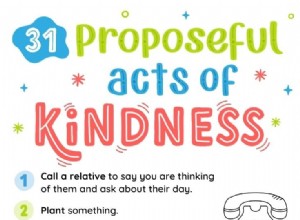عندما بدأت المدرسة ، تحدثت هيلاري بيرد ، مديرة تحرير الوالدين في شيكاغو ، مع جاكلين رايو ، LCPC ، CADC ، من أجل برنامج Master in Parenting Podcast. وهي مستشارة ومنسقة مع AMITA Health التي تعمل مع الأطفال والمراهقين وشاركت في تأسيس مركز العافية العاطفية.
بالنسبة لآباء الأطفال الذين يعانون من قلق المدرسة ، فإن بعض العلامات والإشارات معروفة جيدًا. قدمت بعض النصائح للمساعدة في تعليم الأطفال التعامل مع قلقهم وكيف يمكننا ، كآباء ، أن نؤثر على الطريقة التي يستعد بها الأطفال للحياة. يمكنك الاستماع إلى المحادثة كاملة أدناه.
هيلاري:ما الفرق بين القلق من المدرسة السريرية و "أنا فقط لا أريد الذهاب إلى المدرسة اليوم"؟
جاكلين:أعتقد أنه يتعين علينا أحيانًا النظر إلى ما يحفز هذا السلوك. عندما يشعر الأطفال بالقلق عادة ، نرى أشياء مثل:يشعرون بالارتباك ، ويواجهون صعوبة في إدارة توترهم. غالبًا ما يستخدم الأطفال ، وكذلك البالغون ، الذين يعانون من القلق عبارات مثل "أنا فقط لا أستطيع فعل ذلك" ، "لن تتحسن الأمور أبدًا" ، "إنها دائمًا على هذا النحو ، لن تكون مختلفة أبدًا." يتعثرون في تفكيرهم كثيرًا ويمكن أن توجد أنماط بالأبيض والأسود. الأطفال الذين لا يرغبون في الذهاب إلى المدرسة ، في كثير من الأحيان يكون ذلك مشكلة في التحفيز ، وهناك أشياء أخرى يفضلون القيام بها. عندما يواجه الأطفال صعوبة في الوصول إلى المدرسة ، غالبًا ما أسأل الآباء:"ماذا يفضلون أن يفعلوا ، أو ماذا يفعلون عندما لا يكونون في المدرسة؟" ... بالنسبة لبعض الأطفال الذين يعانون من قلق المدرسة ، يمكن أن تظهر أنماط أخرى. على سبيل المثال ، يواجهون صعوبة في الذهاب إلى المدرسة ، ويبقون في المنزل مع والدتهم أو أبيهم ، وخلال ذلك اليوم يحصلون على الكثير من الاهتمام الإضافي من الأم أو الأب ويشاهدون الكثير من التلفاز ومن خلال هذه الأنماط يمكن أن يظهروا أن الأطفال مع المدرسة سيطور القلق دوافع أخرى للبقاء في المنزل.
ح:هل من السهل على الوالدين التعرف على هذا النوع من القلق؟
J:عادةً ما يكون القلق ، وخاصة القلق المدرسي ، أسوأ يوم الاثنين. في كثير من الأحيان ، يواجه الأطفال صعوبة في الانتقال من الوقت غير المنظم في عطلة نهاية الأسبوع إلى هيكل الأسبوع. لذلك إذا كان طفلك يعاني من قلق المدرسة ، فغالبًا ما ستلاحظ أنه من الصعب بشكل خاص في صباح يوم الإثنين أو في أي يوم أن يكون هناك استراحة أو يوم إجازة من المدرسة. عادة ، أشجع الآباء على البقاء متسقين ، والهدوء والمفتاح للآباء هو إدارة قلقهم عند الاستجابة لأطفالهم.
ح:هل القلق وراثي أم أنك تجد أنه شيء يمكن أن ينتقل لأن الأطفال يلتقطون قلق الوالدين؟
J:بالنسبة لبعض أطفالنا والبعض منا ، نحن أكثر عرضة لأن نكون أكثر حساسية ونحن أكثر عرضة للقلق. حقًا ، أعتقد أن كل شخص لديه القليل من القلق إلى حد ما. لقد ابتعدت بالفعل عن استخدام مصطلحات مثل "القلق" واستخدام مصطلحات مثل "عدم الراحة" أو "التوتر". أنت تريد أن تضع في اعتبارك كيف تستجيب للأطفال بالقلق. ثلاثة أشياء ، على سبيل المثال ، لا تساعد في تخفيف القلق وهي الطمأنينة والإلهاء والتجنب. إذا لاحظت أن طفلك يعاني من القلق ، فأنت تريد تجنب الكثير من الكلام المفرط والكثير من الطمأنينة وتطوير الكثير من أنماط التجنب.
ح:من المثير للاهتمام أن الكلمات التي نستخدمها كأبوين يمكن أن تساعد في إثارة القلق.
J:أو تعزيزها. أعتقد أن الكثير من الآباء سيقولون لي "أنا أعاني مع طفلي ، فأنا أعاني حقًا عندما يكونون غير سعداء. أريد الدخول وإصلاحه ". على سبيل المثال ، كنت أعمل مع والد وقد أدرك عندما اقتربت ابنته من السيارة من المدرسة ، كانت تبدو حزينة ويقول:"ما الخطأ؟" ثم يقضون الكثير من الوقت في طريقهم إلى المنزل يتحدثون عن شيء كان صعبًا في يومها. اضطررت للعمل مع الأب لتغيير طريقة تفكيره والنظر إلى اليوم على أنه يوم يحدث فيه الكثير ، وإذا ركزنا فقط على أحد الجوانب التي كانت صعبة ، فإننا نرسل رسالة إلى ابنته تفيد بأن "من المفترض أن تكون الأشياء رائعة طوال الوقت ، وإذا حدث خطأ ما ، فهناك مشكلة." لذا حول استجوابه إلى ، عندما تأتي إلى السيارة ، حتى لو بدت حزينة ، كان يقول:"مرحبًا! كيف كان يومك؟ أخبرني شيئًا كان جيدًا حقًا عن اليوم ". وكان يدفعها حقًا أولاً للعثور على شيء إيجابي ، ثم يتجه نحو "حسنًا ، ما هو الشيء الأكثر صعوبة؟" عندما تبلغ عن شيء أكثر صعوبة ، لن يقضي الكثير من الوقت في التركيز عليه ، قال "حسنًا ، كيف تعاملت معه" ، وكانت ستبلغ عن كيفية تعاملها معه ثم ينتقل في المحادثة.
ح:إذا كنت والدًا لديك قلقك الخاص ، فكيف تتعامل مع ذلك حتى لا تمر به؟
J:بالنسبة للآباء ، أطلب منهم تحديد ما هو صعب في الأبوة والأمومة. ما الذي يجعلك تتفاعل عاطفيا؟ هل هو عندما يكون طفلك غير سعيد ، هل هو عندما يلعب طفلك بمفرده بدون أصدقائه ، هل هو عندما يبدأ طفلك في المعاناة؟ تعرف على تلك الأشياء في الأبوة والأمومة التي تجعلك تتفاعل عاطفيًا وتبدأ في الانسجام مع ردود الفعل هذه. I often ask parents:Do you ever find it helpful to scream at your child? Do you ever find it helpful to get into a power struggle with them? When we’re in that rational mindset we can identify that’s not helpful, but when anxiety and worry takes over, what happens is that a lot of times we emotionally react. We do a lot of talking and a lot of reassurance and we want to protect our kids, but ultimately that can create reinforced patterns that aren’t healthy.
H:Is that tough, because you want to talk to your kid about it because you don’t want them to think “oh, you’re not noticing it?” but you don’t want to react too much?
J:I use the analogy of the airplane a lot:If you’re on an airplane and there’s a lot of turbulence, who are you going to look at to assess the situation? Most parents will say “I’m going to look at the flight attendant.” If you look to the flight attendant, how do you want them to appear? You don’t want them running up and down the aisle hugging you and giving you a lot of extra cookies, because you’re going to say “Oh my gosh, something’s really wrong in this environment!” You want them to be calm and cool and collected, and that gives you a sense of safety.
For a lot of my parents, I work with them on staying calm and depending on the child’s age, I will have parents say to the child “I really care about you, but I want you to be more confident, so when you are at school and having a hard time, I want you to learn that you can work with your teacher on this. So, I’m not going to keep asking you if you’re OK.”
I tend to use a more solution-focused approach, so I ask people, “tell me something that went well today, or tell me about a time that you were anxious and you really worked through it on your own and how were you able to do that” versus focusing on the time that they really struggled.
H:Does this kind of anxiety show up in grades?
J:It can. I have a lot of kids that have performance anxiety as well as social anxiety. I had one young lady I worked with, she was 8 years old, and she didn’t want to go to school on days there were math tests. She was very, very stressed and anxious about her math tests, and she was worried about not performing well. I talked to her and (her) mom, and one of the things I noticed is that Mom, several times throughout the session, said things like “Jackie, my daughter is really gifted and really bright.” And I noticed when Mom said that that the girl’s face looked down. For this 8-year-old girl it caused her a lot of fear of failure when she heard how gifted and bright she was because that created an expectation for her that she had to perform at a higher level.
H:When we put expectations on kids that they can’t control – like height and what they look like, a 12-year-old that looks 15 – do some of those expectations manifest as anxiety?
J:When kids aren’t able to create realistic expectations for themselves, they feel like a failure or they feel like they’re not measuring up. I hear that from so many kids:they just don’t feel like they’re measuring up. So we work on “What’s realistic for you? Can you manage? What’s going on in your day?” Kids really need down time, they need to learn to experience down time and be OK with it.
There’s a lot of trends with technology. Back 20 years ago, parents spent a lot of time talking with their kids. You’d go to a Starbucks and you’d see a mom talking with her child. Today a lot of times you walk into a coffee shop and the child’s on the iPad and the mom’s on the phone and why this is so important is that this is such a vital time to work on social skills, communication—many of the kids I work with struggle with communication, they’ll struggle asking for help—so making sure you just really spend time with your kids every day without any electronics, just really having some basic down time. I will hear from kids more often than not “I just don’t get a lot of that face time, everybody’s busy, everyone is on their phones.” And kids will say to me, in middle school and high school, “I just want someone to talk to.”
H:Is there a fine line between setting your child up for anxiety and setting goals?
J:One thing I’ve learned is really trying to listen to kids and ask them questions:How do you want to make that happen? What do you think is a good approach? Really get the kids thinking as opposed to being mindful of putting your wants or your desires on them. A lot of kids have a hard time making their own decisions. They’re so nervous about making the wrong decision and they’re so worried about failing that they, in turn, are trying to please others.
Listen to more episodes of our Masters in Parenting podcast.






